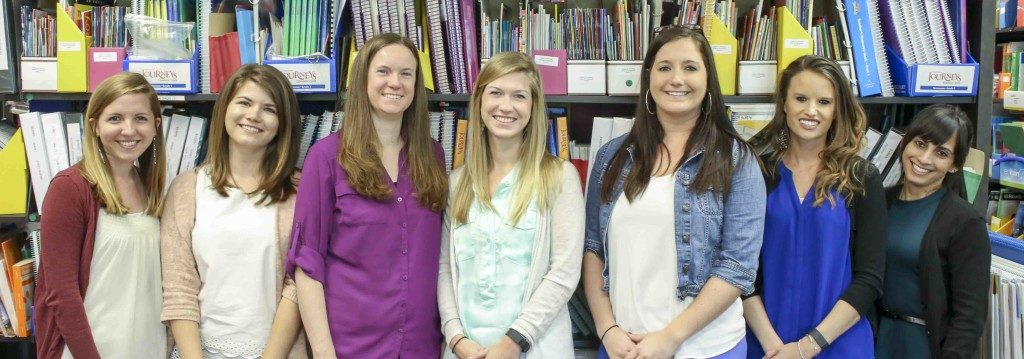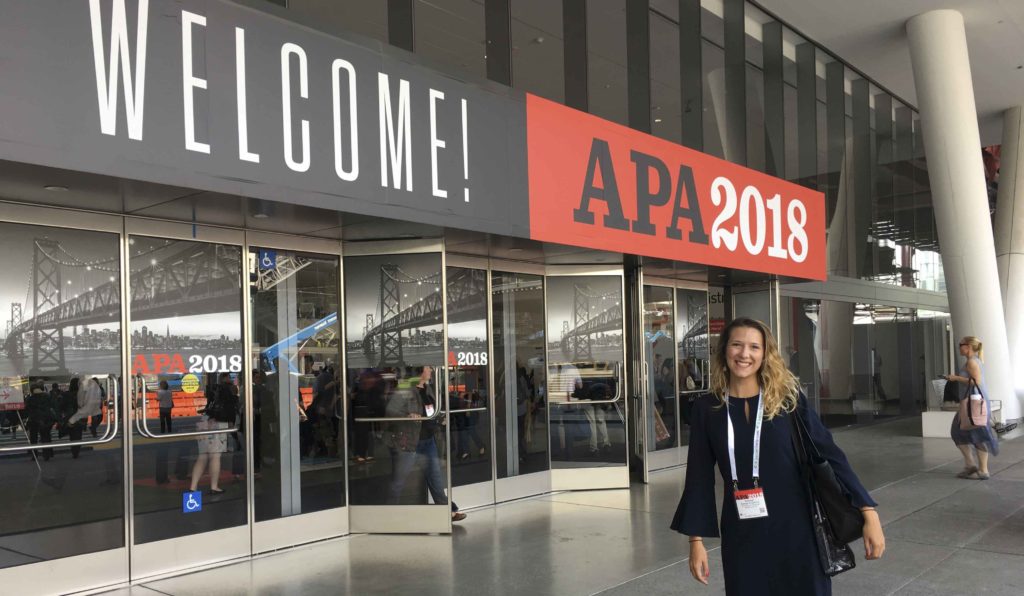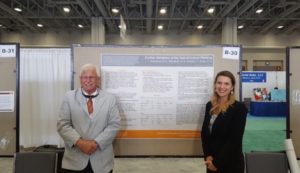
School Psychology
Samantha is currently seeking her PhD in School Psychology. Originally from Centerville, OH she received her BA in psychology from Cedarville University (Ohio) and her MS in Applied Educational Psychology from UT Knoxville. In 2012, she joined EPC. We asked her to reflect on some past and current experiences. Read her responses below.

Awards
- Chancellor’s Fellowship (2012-2016): Fellowship given to support the continued education of students.
- The Ron Carlini Persistence Award (2014): Award given through the school psychology program for assisting with the APA accreditation process.
Accomplishments
Roles/Positions
GRA in the School Psychology program: 2012-2015
KLASS Center Clinic Coordinator: 2015-2016
GTA for Assessment Practicum in the School Psychology program: 2015-2016
Peer Reviewed Publications
Cazzell, S. S., Browarnik, B. L., Skinner, A. L., Cihak, D. F., Skinner, C. H., & Forbes, B. (2016). Extending research on a computer-based flashcard reading intervention to post-secondary students with intellectual disabilities. School Psychology Forum: Research in Practice, 10, 191-206.
Forbes, B. E., Skinner, C. H., Maurer, K. M., Taylor, E. P., Schall, M., Cazzell, S., Ciancio, D., Conley, M., & Conley, E. (2014). Prompting faster reading during fluency assessments: The impact of skill level and comprehension measures on changes in performance. Research in the Schools.
Watson, T. L., Skinner, C. H., Skinner, A. L., Cazzell, S., Aspiranti, K., Moore, T., and Coleman, M. (2016). Preventing disruptive behavior via classroom management: Validating the color wheel system in kindergarten classrooms. Behavior Modification, 1, 1-23.
Schall, M., Skinner, C. H., Cazzell, S., Ciancio, D., Ruddy, J., & Thompson, K. (e print January 2016). Extending research on oral reading fluency measures, reading speed, and comprehension. Contemporary School Psychology. DOI 10.1007/s40688-015-0083-
Cazzell, S., Skinner, C., Ciancio, D., Aspiranti, K., Watson, T., Taylor, K., McCurdy, M., & Skinner, A. (in submission). Evaluating a Computer Flashcard Sight-Word Recognition Intervention with Self-Determined Response Intervals in Elementary Students with Intellectual Disability. School Psychology Quarterly.
Peer Reviewed Presentations
Cazzell, S., Taylor, K., Skinner, C., McCurdy, M., Skinner, A., Ciancio, D., Beeson, T., & Cihak, D. (February 2016). Evaluating a computer flashcard reading intervention with self-determined response intervals in a post-secondary student with Intellectual Disability. Poster presented at the University of Tennessee Gallery of Excellence, Knoxville TN.
Gibbons, S., Ryan, K., Skinner, C., Taylor, K., Beeson, T., Ciancio, D., & Cazzell, S. (February 2016). Expanding Research on a Computer-Based Flashcard Reading Intervention with a Post-Secondary Student in the FUTURE Program.Poster presented at the University of Tennessee Gallery of Excellence, Knoxville TN.
Taylor, K., Skinner, C., Cazzell, S., Ruddy, J., Ciancio, D., Cihak, D., & Beeson, T. (February 2016). Perceptual disfluency and learning in a FUTURE student with Intellectual Disability. Poster submitted for presentation at the University of Tennessee Gallery of Excellence, Knoxville, TN.
Taylor, K., Crabtree, K., Turnbull, S., Ciancio, D., & Skinner, C. (August 2015). The effectiveness of readability formulas as predictors of oral reading fluency. American Psychological Association (APA) Conference, Toronto, Ontario.
Schall, M., Skinner, C. H., Cazzell, S., Ciancio, D., Ruddy, J., & Thompson, K. (February 2015). Extending research on oral reading fluency measures, reading speed, and comprehension: The ransom note study. Presented at the National Association for School Psychologists (NASP) Conference, Orlando, FL.
Schall, M., Skinner, C. H., Cazzell, S., Ciancio, D., Ruddy, J., & Thompson, K. (October 2014). Extending research on oral reading fluency measures, reading speed, and comprehension: The ransom note study. Presented at the Tennessee Association of School Psychologists (TASP) Conference, Chattanooga, TN.
Tiffany, W., Katie, C., & Cazzell, S. (October 2014). The Effectiveness of Readability Formulas as Predictors of Oral Reading Fluency. Presented at the Tennessee Association of School Psychologists (TASP) Conference, Chattanooga, TN.
Cazzell, S. (April 2014). Student perceptions of the utility and effectiveness of a computer-reading intervention. Presented at the University of Tennessee (Survey Research class), Knoxville, TN.
Forbes, B. E., Schall, M., Cazzell, S., Taylor E. P., & Skinner, C. H. (February 2014). Prompting faster reading: The impact of comprehension measure. Presented at the National Association of School Psychologists (NASP) Conference, Washington, D.C.
Cazzell, S. S., Browarnik, B. L., Skinner, A. L., Cihak, D. F., Skinner, C. H., & Forbes, B. (November 2013). Extending research on a computer-based flashcard reading intervention to post-secondary students with intellectual disabilities. Presented at the Tennessee Association of School Psychologists (TASP) Conference, Montgomery Bell State Park, Burns, TN.
Cazzell, S. S., Browarnik, B. (November 2013). Assessment of Two Reading Interventions. Presented at the Tennessee Association of School Psychologists (TASP) Conference, Montgomery Bell State Park, Burns, TN.
Cazzell, S. S., Browarnik, B. (March 2013). Assessment of Two Reading Interventions. Presented at the Graduate Student Research Colloquium, University of Tennessee, Knoxville, TN.
See Curriculum Vita for additional details.
Current Occupation
Pre-Doctoral School Psychology Intern
Lenoir City Schools
Lenoir City, TN
As a school psychology intern at Lenoir City Schools, I will be working with students in elementary, middle, and high school who have academic, behavioral, and/or social-emotional concerns. In these schools, I assess students with educational concerns, develop academic and behavioral interventions, and consult with parents and teachers to promote student growth. I also have opportunities to counsel students with social-emotional concerns.
Personal Interests
I have really enjoyed exploring Knoxville after moving here from Ohio for graduate school. I especially like visiting the mountains with my husband, going downtown to shop at the Farmer’s Market, paddle-boarding at the Quarry, and trying out new restaurants. I also enjoy baking treats, going on walks after work, and spending time with my family and friends.
Future/Vocational Goals
After I complete my internship, I hope to work in the schools and put the skills that I have learned into practice. I especially like working in school environments because it allows for continued collaboration with teachers and parents to make educational decisions that benefit students. Eventually, I may pursue licensure in the hopes of becoming a licensed psychologist so that I can also have the opportunity to work in a clinic setting with children, adults, and families.

What sold you on this program?
I decided to attend the University of Tennessee to study school psychology for several reasons. To begin, I appreciated this program’s timeline that allows for students to progress through classes, complete their dissertation and internship, and ultimately, finish the program within five years. I also liked how supportive the students appeared during the interview process and how willing they were to answer all of my questions. Finally, I chose this program because of the funding opportunities presented through assistantships. I am so thankful that this funding was available throughout the duration of my time at UT Knoxville.
What would you tell an incoming student who joins the program?
I would encourage students to develop a good working relationship with their cohort and seek outside experiences to broaden their knowledge-base, especially during the first few years of the program. In seeking outside opportunities in their respective area(s) of interest, students can build their vitaes and gain experiences working with varied populations that will be beneficial when applying for internships and jobs. Also, don’t be afraid to ask questions! Getting through a graduate program is a long process, and the cohorts above you are excellent sources of information if you have any questions.








